Best Consumer Goods Stocks For 2025



Editorial Note: While we adhere to strict Editorial Integrity, this post may contain references to products from our partners. Here's an explanation for How We Make Money. None of the data and information on this webpage constitutes investment advice according to our Disclaimer.
Best Consumer Goods Stocks For 2025:
- Coca-Cola - the company has a strong financial track record, including strong profitability and solid revenue growth;
- United Natural Foods - the company specializes in natural and organic food products;
- Kraft Heinz - the company offers a high dividend yield and consistently increases distributions to shareholders;
- J.M. Smucker - the company, known for its food products, also features a high dividend and stable financial position;
- Archer-Daniels-Midland is an international agricultural products processing and commodities trading company.
Investing in consumer goods stocks has always been popular among investors due to their stability and potential for growth. Consumer staples companies play a key role in the economy, ensuring continued demand for their products even during times of economic instability. In this article, we take a look at the best consumer staples stocks to buy now, their financials, analysts' forecasts and growth prospects.
The best consumer goods stocks to buy now
Some of the most reliable and promising consumer goods stocks today are as follows:
| Name | Stock Ticker | Founded | Market capitalization, B (USD) | EPS estimate | Dividend yield |
|---|---|---|---|---|---|
Coca-Cola | KO | 1886 | 275.52 | 0.80 | 3.03% |
United Natural Foods | UNFI | 1976 | 763.60 | -0.06 | no data |
Kraft Heinz | KHC | 1909 | 39.29 | 0.75 | 4.95% |
J.M. Smucker | SJM | 1897 | 11.52 | 2.16 | 3.94% |
Archer-Daniels-Midland | ADM | 1902 | 30.25 | 1.27 | 3.30% |
Dollar General | DG | 1939 | 28.47 | 1.81 | 1.83% |
Coca-Cola (NYSE: KO). The company has a strong financial track record, including strong profitability and solid revenue growth. Analysts recommend buying the company's stock, predicting significant growth in its value in the coming years.
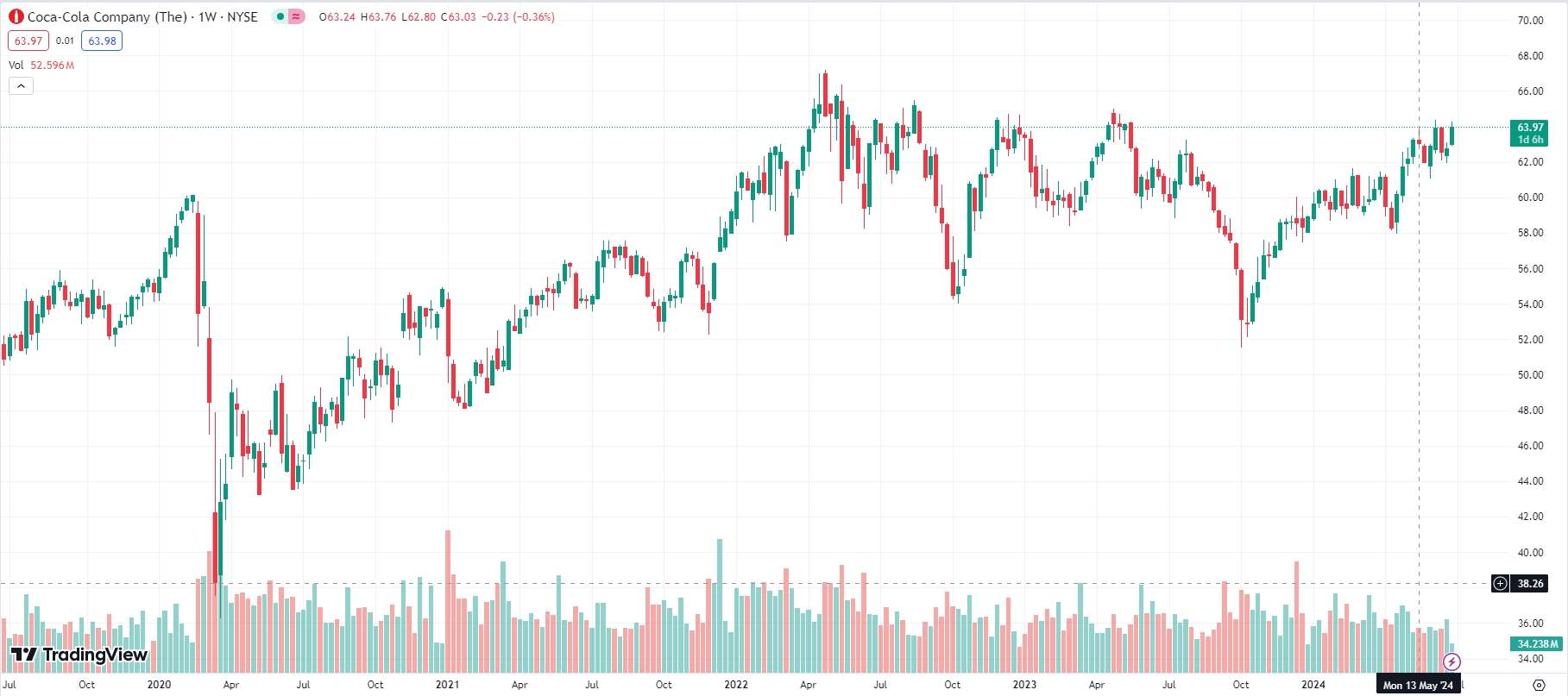
United Natural Foods (NYSE: UNFI). The company, which specializes in natural and organic food products, has a high growth rate and low bankruptcy risk, making its stock attractive to investors.
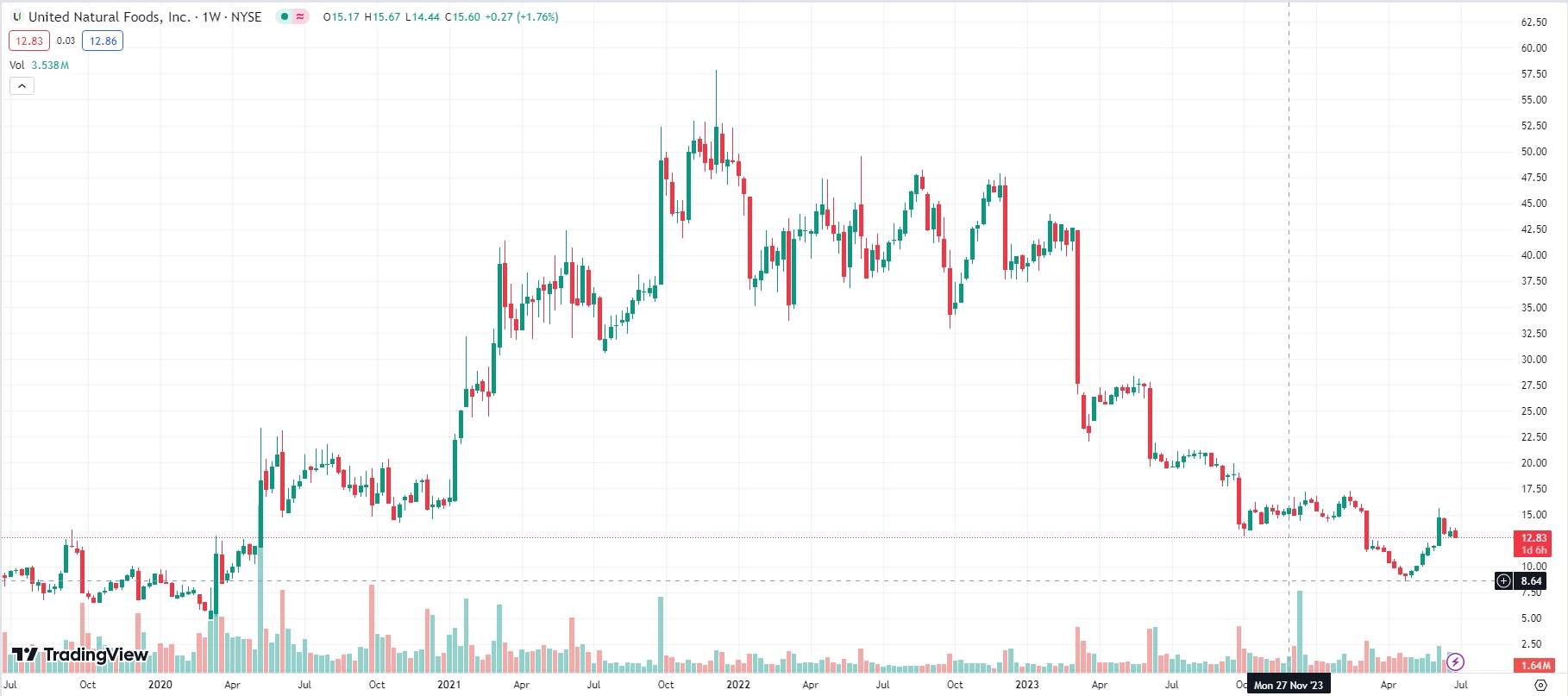
Kraft Heinz (NASDAQ: KHC). The company offers a high dividend yield and consistently increases distributions to shareholders. Kraft Heinz stock is a reliable source of passive income.
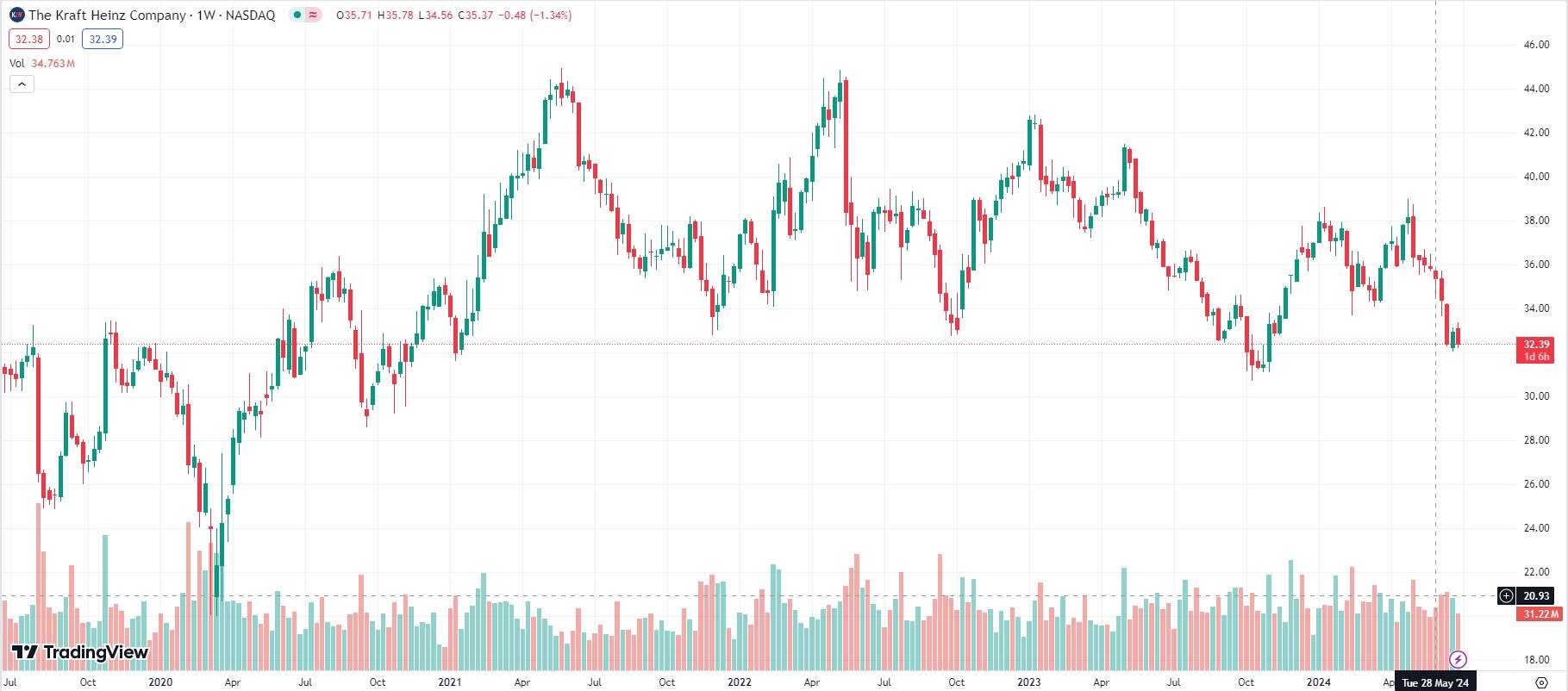
J.M. Smucker (NYSE: SJM). The company, known for its food products, also features a high dividend and stable financial position.
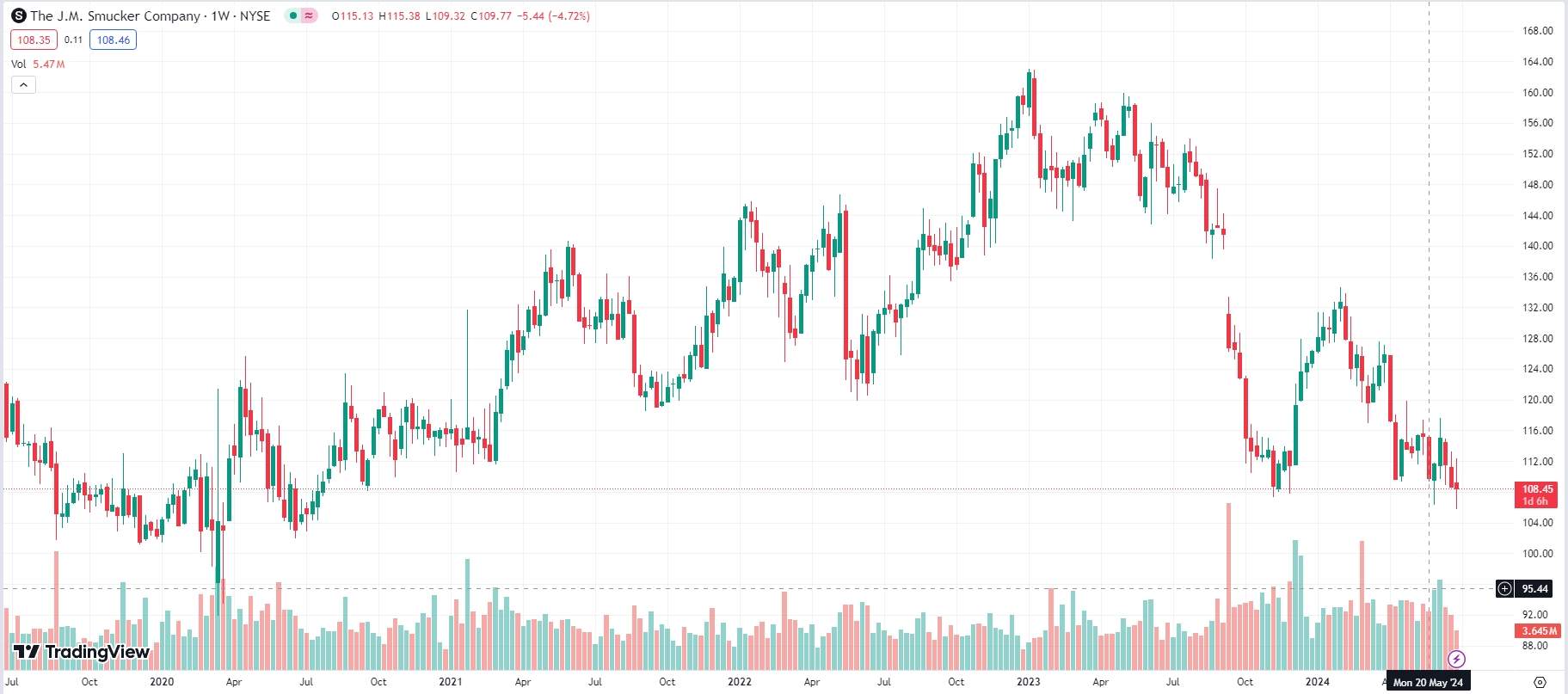
Archer-Daniels-Midland (NYSE: ADM) is an international agricultural products processing and commodities trading company. It processes grains and oilseeds for use in the food, beverage, and feed industries. The company has shown significant revenue growth and stable financial performance in recent years. Its Altman Z-Score, which measures bankruptcy risk, is at a high level, indicating a low probability of financial distress.
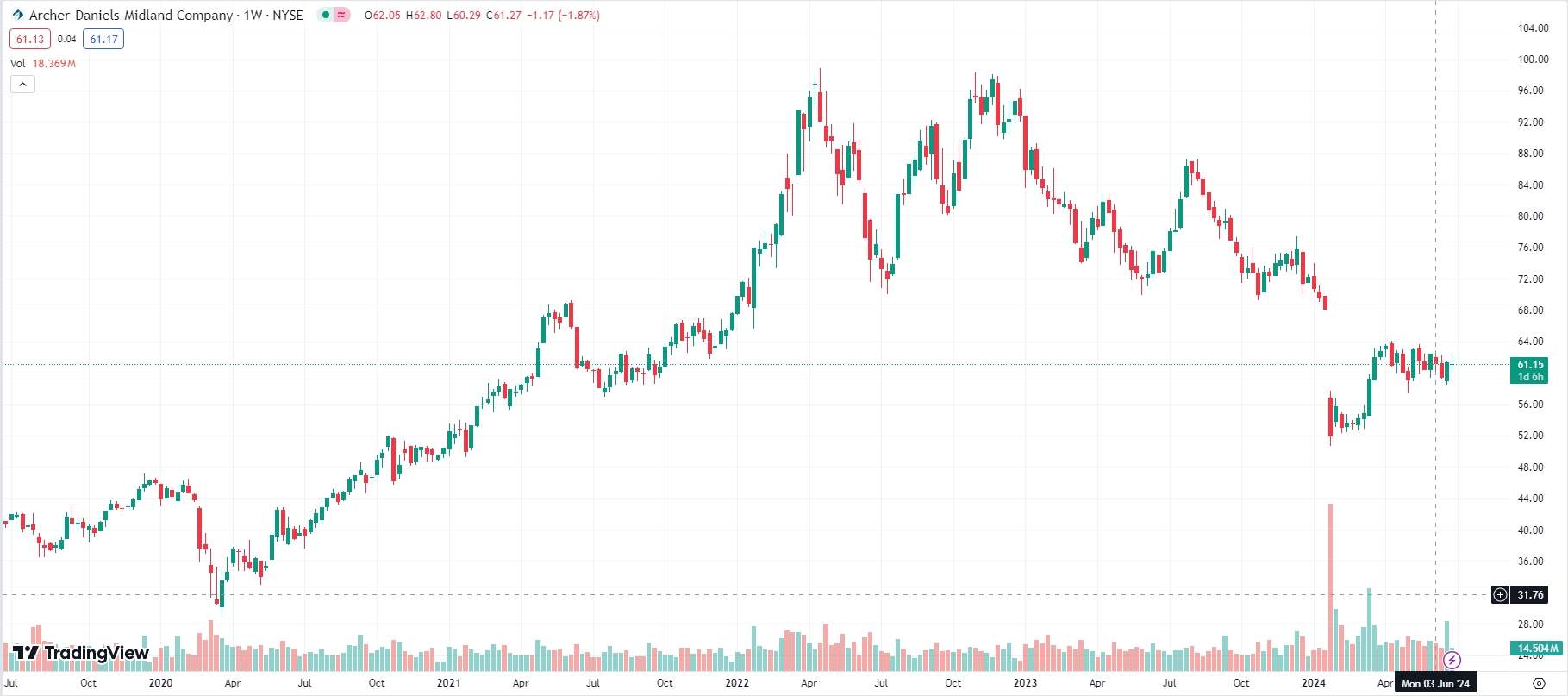
Dollar General (NYSE: DG) is a chain of stores offering a wide range of products at affordable prices. The company successfully adapts to economic changes and demonstrates stable revenue growth even in times of economic instability. The company's stores attract economy-oriented shoppers, which ensures a steady demand for its products.
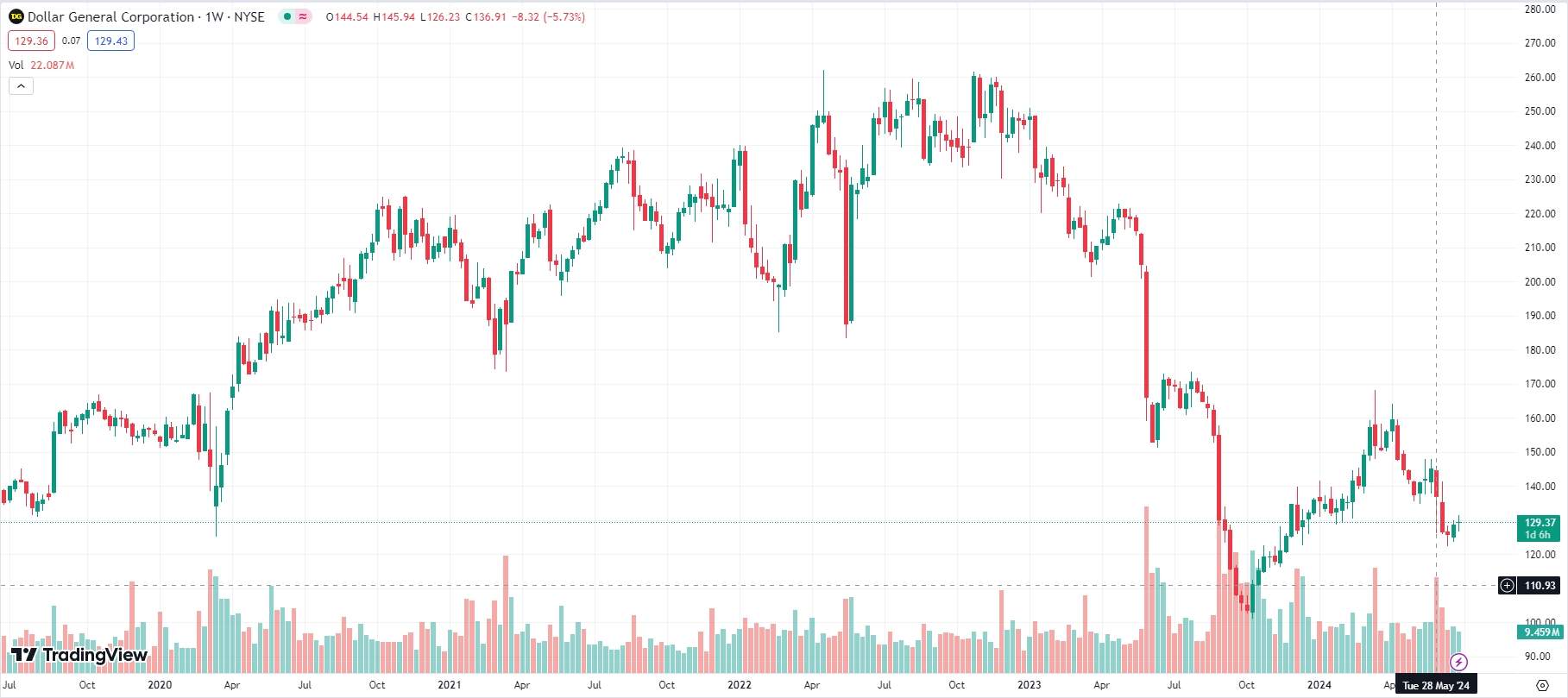
How to choose the best consumer goods stocks
Financial indicators when choosing the best consumer goods stocks
Revenue and profit — stable growth in revenue and profit is a sign of the company’s successful activities and its stability in the market.
Profitability — high profitability ratios, such as return on equity (ROE), indicate that a company is using its resources efficiently.
Ratios and indices — for example, the Altman Z-Score helps assess a company's risk of bankruptcy. High values of this ratio indicate low risk.
Forecasts and recommendations of analysts
Analytical and consulting companies provide their clients with recommendations and forecasts for stocks based on a detailed analysis of their financial condition and market conditions. In particular, Coca-Cola and Archer-Daniels-Midland stocks have high valuations and are projected to rise, making them attractive to investors.
To buy best consumer goods stocks, we have selected several brokers. They open the doors to the stock market where you can buy shares of the above mentioned companies and shares of other companies you like. These brokers are reliable and offer good terms on deals.
| Broker | Stocks | Demo | Minimum account, $ | Stocks/ETFs Fee per share basic | Stocks/ETFs per share min | |
|---|---|---|---|---|---|---|
Yes | Yes | 100 | No | No | Open an account Your capital is at risk.
| |
Yes | No | 0 | €2,00 + €0,038 per share for US stocks | €2,00 for US stocks | ||
Yes | Yes | 2000 | US Stocks: $0.01 per share; min fee of $2, max of 1% of the trade value. EU Stocks: 0.1% of trade value with a min fee of €4 and a max of €99. | US Stocks $2, EU Stocks €4 | Open an account Your capital is at risk.
| |
Yes | No | 0 | After exceeding the free trades, the fee is 0.25% of the order amount, with a min fee of £1.00 (or equivalent in other currencies) | £1.00 in the UK, €1.00 in the Eurozone | ||
Yes | Yes | 0 | 0 | $1,00 | Open an account Your capital is at risk. |
Pros and cons of buying consumer goods stocks
- Pros
- Cons
- Steady Demand: Consumer goods are essential items that people use daily, such as food, beverages, household products, and personal care items. This consistent demand can make consumer goods stocks relatively stable and less volatile compared to other sectors.
- Economic Resilience: Many consumer goods companies produce items that are considered necessities. This makes them more resilient during economic downturns, as consumers are likely to continue purchasing these products even in challenging economic conditions.
- Dividend Payments: Consumer goods companies often have strong cash flows and profitability, allowing them to pay regular dividends to shareholders. This can provide a steady income stream, which is particularly attractive to long-term investors.
- Brand Loyalty: Established consumer goods companies often benefit from strong brand loyalty. Customers are more likely to stick with brands they trust, which can provide a competitive advantage and drive long-term growth.
- Global Presence: Many consumer goods companies operate on a global scale, allowing them to tap into emerging markets and benefit from international growth opportunities. This diversification can help mitigate risks associated with relying on a single market.
- Low Growth Potential: While consumer goods stocks can be stable, they often offer lower growth potential compared to other sectors like technology or healthcare. This can limit the upside for investors seeking significant capital appreciation.
- Intense Competition: The consumer goods sector is highly competitive, with numerous companies vying for market share. This competition can lead to price wars, reduced profit margins, and increased marketing expenses.
- Sensitivity to Consumer Trends: Consumer preferences and trends can change rapidly. Companies must continuously innovate and adapt to shifting consumer tastes, which can be costly and challenging.
- Economic Cycles: While consumer goods are generally resilient, they are not entirely immune to economic cycles. During severe recessions, even essential items may see reduced demand as consumers cut back on spending.
Diversify your portfolio with fast growing companies and high dividends
Buying the best consumer staples stocks requires careful analysis and understanding of market trends. Firstly, it is important to focus on companies with stable financial performance and stable demand for products. I recommend diversifying your portfolio to include both high-dividend companies and high-growth firms. Remember to follow analyst recommendations and evaluate the companies' long-term prospects. Also, monitor market news and financial reports regularly. This will help you make investment decisions effectively. Ultimately, patience and a strategic approach are the keys to successful investing.
Conclusion
Investing in consumer product stocks can be a reliable way to protect and grow capital due to the steady demand for these companies' products. By choosing stocks of companies with strong financials, high dividends and resilient to economic changes, investors can build a balanced and income-producing portfolio. It is important to regularly monitor market conditions and analysts' forecasts to make informed investment decisions.
FAQs
What are the risks associated with investing in consumer goods stocks?
Risks of investing in consumer goods stocks include market fluctuations, changes in consumer demand, the impact of macroeconomic factors, competition in the sector and possible changes in the regulatory environment.
How to choose companies with high growth potential in the consumer goods sector?
To do this, analyze financial indicators such as revenue, profit and profitability, and evaluate companies' innovation strategies and their ability to adapt to market changes.
What investment strategies can you use when buying consumer staples stocks?
Investors can diversify their portfolio, invest in high-dividend stocks for stable income, and hold long-term stocks of companies with high growth potential to maximize returns.
How to monitor changes in the consumer goods market and respond to them in a timely manner?
To do this, it is important to regularly monitor financial news, analyze quarterly and annual company reports, follow analyst recommendations and use specialized financial platforms and tools for market monitoring.
Related Articles
Team that worked on the article
Chinmay Soni is a financial analyst with more than 5 years of experience in working with stocks, Forex, derivatives, and other assets. As a founder of a boutique research firm and an active researcher, he covers various industries and fields, providing insights backed by statistical data. He is also an educator in the field of finance and technology.
As an author for Traders Union, he contributes his deep analytical insights on various topics, taking into account various aspects.

Dr. BJ Johnson is a PhD in English Language and an editor with over 15 years of experience. He earned his degree in English Language in the U.S and the UK. In 2020, Dr. Johnson joined the Traders Union team. Since then, he has created over 100 exclusive articles and edited over 300 articles of other authors.
Mirjan Hipolito is a journalist and news editor at Traders Union. She is an expert crypto writer with five years of experience in the financial markets. Her specialties are daily market news, price predictions, and Initial Coin Offerings (ICO).
Diversification is an investment strategy that involves spreading investments across different asset classes, industries, and geographic regions to reduce overall risk.
Cryptocurrency is a type of digital or virtual currency that relies on cryptography for security. Unlike traditional currencies issued by governments (fiat currencies), cryptocurrencies operate on decentralized networks, typically based on blockchain technology.
Yield refers to the earnings or income derived from an investment. It mirrors the returns generated by owning assets such as stocks, bonds, or other financial instruments.
An investor is an individual, who invests money in an asset with the expectation that its value would appreciate in the future. The asset can be anything, including a bond, debenture, mutual fund, equity, gold, silver, exchange-traded funds (ETFs), and real-estate property.






























































































































